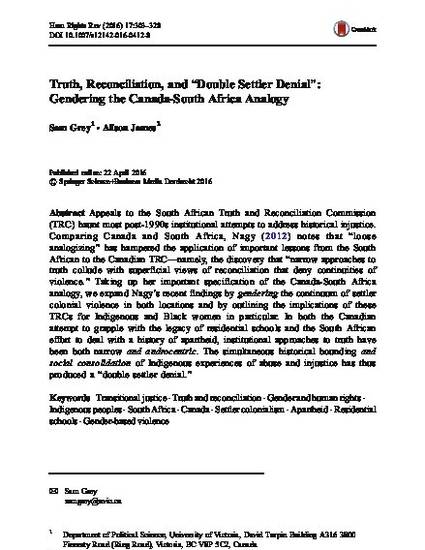
Article
Truth, Reconcilation, and 'Double Settler Denial'.pdf
Human Rights Review
(2016)
Abstract
Comparisons to the South African Truth and Reconciliation Commission (TRC) haunt most post-1990s institutional attempts to address historical injustice. Comparing Canada and South Africa, Nagy (2012) notes that “loose analogizing” has hampered the application of important lessons from South Africa to the Canadian TRC – namely, the discovery that “narrow approaches to truth collude with superficial views of reconciliation that deny continuities of violence.” Taking up her important specification of the Canada-South Africa analogy, we expand Nagy’s recent findings by gendering the continuum of Settler colonial violence in both locations, and by outlining the implications of these TRCs for Indigenous and Black women in particular. In both the Canadian attempt to grapple with the legacy of residential schools and the South African effort to deal with a history of apartheid, institutional approaches to truth have been both narrow and androcentric. The simultaneous historical bounding and social consolidation of Indigenous experiences of abuse and injustice has thus produced a ‘double Settler denial.’
Keywords
- transitional justice,
- truth and reconciliation,
- gender and human rights,
- Indigenous Peoples,
- South Africa,
- Canada,
- Settler colonialism,
- apartheid,
- residential schools,
- gender-based violence
Disciplines
Publication Date
2016
Citation Information
Grey, Sam & Alison James. “Truth, Reconciliation, and ‘Double Settler Denial:’ Gendering the Canada-South Africa Analogy.” Human Rights Review vol. 17, issue 3 (2016): pp. 303-328.
